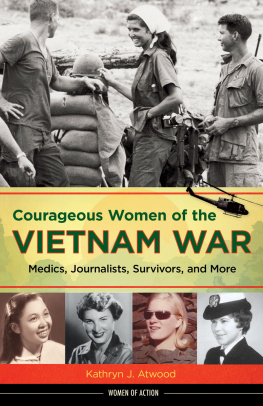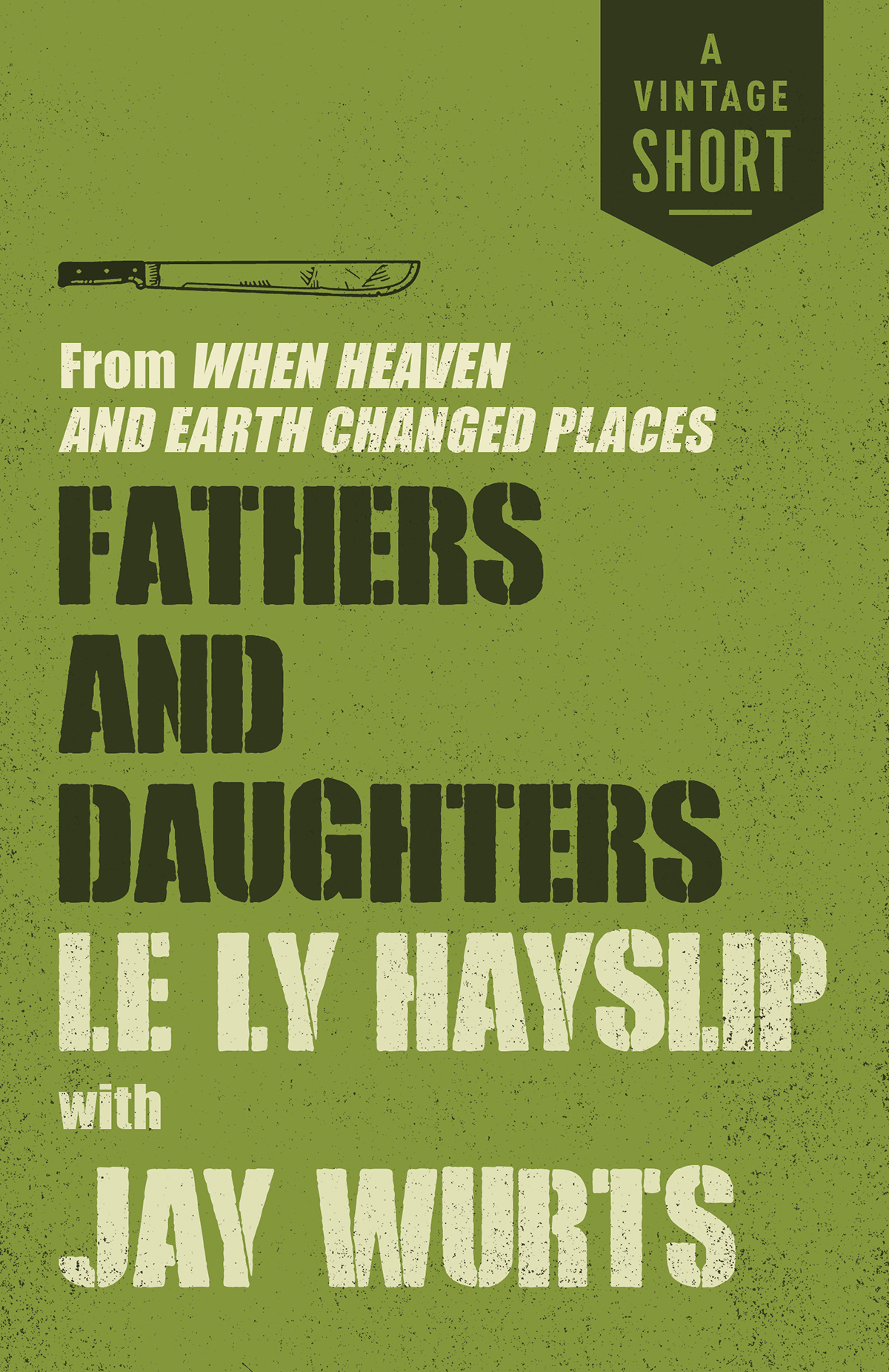Fathers and Daughters
from When Heaven and Earth Changed Places
by Le Ly Hayslip
with Jay Wurts
A Vintage Short
Vintage Books
A Division of Penguin Random House LLC
New York
Contents
Copyright 1989, 2017 by Le Ly Hayslip and Charles Jay Wurts
All rights reserved. Published in the United States by Vintage Books, a division of Penguin Random House LLC, New York, and in Canada by Random House of Canada, a division of Penguin Random House Canada Limited, Toronto. Originally published in hardcover in the United States by Doubleday, a division of Penguin Random House LLC, New York, in 1989, and subsequently in paperback by Plume, a division of Penguin Random House LLC, New York, in 1990.
Vintage and colophon are registered trademarks of Penguin Random House LLC.
The Cataloging-in-Publication Data for When Heaven and Earth Changed Places is available from the Library of Congress.
Vintage eShort ISBN9780525436638
Series cover design by Cardon Webb
www.vintagebooks.com
v4.1
a
Le Ly Hayslip
Phung Le Ly Hayslip was born in Vietnam in 1950. She is the author of two memoirsWhen Heaven and Earth Changed Places and Child of War, Woman of Peacewhich were adapted into the film Heaven and Earth by Oliver Stone. Since 1986, she has helped rebuild her motherland through the two charitable organizations she established. Her efforts now focus exclusively on supporting the orphanages she founded in Vietnam.
Jay Wurts, an Air Guard pilot during the Vietnam War, has written and edited a variety of books.
www.lelyhayslip.wix.com/gratitude
www.jaywurts.com
AFTER MY BROTHER BON went North, I began to pay more attention to my father.
He was built solidlybig-bonedfor a Vietnamese man, which meant he probably had well-fed, noble ancestors. People said he had the body of a natural-born warrior. He was a year younger and an inch shorter than my mother, but just as good-looking. His face was round, like a Khmer or Thai, and his complexion was brown as soy from working all his life in the sun. He was very easygoing about everything and seldom in a hurry. Seldom, too, did he say no to a requestfrom his children or his neighbors. Although he took everything in stride, he was a hard and diligent worker. Even on holidays, he was always mending things or tending to our house and animals. He would not wait to be asked for help if he saw someone in trouble. Similarly, he always said what he thought, although he knew, like most honest men, when to keep silent. Because of his honesty, his empathy, and his openness to people, he understood life deeply. Perhaps that is why he was so easygoing. Only a half-trained mechanic thinks everything needs fixing.
He loved to smoke cigars and grew a little tobacco in our yard. My mother always wanted him to sell it, but there was hardly ever enough to take to market. I think for her it was the principle of the thing: smoking cigars was like burning money. Naturally, she had a song for such gentle vicesher own habit of chewing betel nuts included:
Get rid of your tobacco,
And you will get a water buffalo.
Give away your betel,
And you will get more paddy land.
Despite her own good advice, she never abstained from chewing betel, nor my father from smoking cigars. They were rare luxuries that life and the war allowed them.
My father also liked rice wine, which we made; and enjoyed an occasional beer, which he purchased when there was nothing else we needed. After hed had a few sips, he would tell jokes and happy stories and the village kids would flock around. Because I was his youngest daughter, I was entitled to listen from his kneethe place of honor. Sometimes he would sing funny songs about whoever threatened the village and we would feel better. For example, when the French or Moroccan soldiers were near, he would sing:
There are many kinds of vegetables,
Why do you like spinach?
There are many kinds of wealth,
Why do you use Minh money?
There are many kinds of people,
Why do you love terrorists?
We laughed because these were all the things the French told us about the Viet Minh fighters whom we favored in the war. Years later, when the Viet Cong were near, he would sing:
There are many kinds of vegetables,
Why do you like spinach?
There are many kinds of money,
Why do you use Yankee dollars?
There are many kinds of people,
Why do you disobey your ancestors?
This was funny because the words were taken from the speeches the North Vietnamese cadres delivered to shame us for helping the Republic. He used to have a song for when the Viet Minh were near, too, which asked in the same way, Why do you use francs? and Why do you love French traitors? Because he sang these songs with a comical voice, my mother never appreciated them. She couldnt see the absurdity of our situation as clearly as we children. To her, war and real life were different. To us, they were all the same.
Even as a parent, my father was more lenient than our mother, and we sometimes ran to him for help when she was angry. Most of the time, it didnt work and he would lovingly rub our heads as we were dragged off to be spanked. The village saying went: A naughty child learns more from a whipping stick than a sweet stick. We children were never quite sure about that, but agreed the whipping stick was an eloquent teacher. When he absolutely had to punish us himself, he didnt waste time. Wordlessly, he would find a long, supple bamboo stick and let us have it behind our thighs. It stung, but he could have whipped us harder. I think seeing the pain in his face hurt more than receiving his halfhearted blows. Because of that, we seldom did anything to merit a fathers spankingthe highest penalty in our family. Violence in any form offended him. For this reason, I think, he grew old before his time.
One of the few times my father ever touched my mother in a way not consistent with love was during one of the yearly floods, when people came to our village for safety from the lower ground. We sheltered many in our house, which was nothing more than a two-room hut with woven mats for a floor. I came home one day in winter rain to see refugees and Republican soldiers milling around outside. They did not know I lived there so I had to elbow my way inside. It was nearly suppertime and I knew my mother would be fixing as much food as we could spare.
In the part of the house we used as our kitchen, I discovered my mother crying. She and my father had gotten into an argument outside a few minutes before. He had assured the refugees he would find something to eat for everyone and she insisted there would not be enough for her children if everyone was fed. He repeated his order to her, this time loud enough for all to hear. Naturally, he thought this would end the argument. She persisted in contradicting him, so he had slapped her.
This show of male powerwe called it do danh vowas usual behavior for Vietnamese husbands but unusual for my father. My mother could be as strict as she wished with his children and he would seldom interfere. Now, I discovered there were limits even to his great patience. I saw the glowing red mark on her cheek and asked if she was crying because it hurt. She said no. She said she was crying because her action had caused my father to lose face in front of strangers. She promised that if I ever did what she had done to a husband, I would have both cheeks glowing: one from his blow and one from hers.






